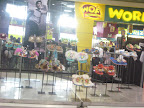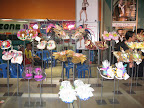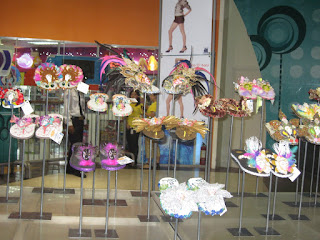Search This Blog
 |
| From Philippines, Bacolod |
Monday, October 19, 2009
HISTORY
How MassKara came about
By Christine Mae Pelayo
THE MassKara Festival began in 1980 amid an overwhelming crises aggravated by the downfall in the prices of sugar in the world market, the heart-breaking mv Don Juan sea tragedy, and the worsening peace and order situation that threatened not just Negros, the Philippines' sugar capital, but the whole country as a whole.
Pictures of malnourished children in Negros, the "Batang Negros," were flashed in magazines and newspapers all over the world.
It was when the situation was so dire and hopeless that the indomitable spirit of the Negrenses emerged, galvanizing the people to overcome the gloom and celebrate life!
Happy grins were then carved in paper mache to hide the despair and grief behind the masks.
Thus, the hope for a brighter tomorrow was born.
MassKara Festival is the biggest annual tourism event in the province that coincides with Bacolod City's Charter Day celebration.
The term 'Masskara' was derived from the word 'Mass,' which means a multitude of people and the Spanish word 'Kara' which means face. Thus, Masskara means the "face of the masses."
The happy masks underscore the Bacolodnons' special zest for life and for fun. Inspired by the Mardi Gras celebration of New Orleans in the US and of Rio de Janiero in Brazil, the festival is highlighted by a dance parade of masked dancers, swaying and dancing to the infectious rhythm and beat of Latin music. Spectators are usually caught up in the exuberant gaiety of this explosion of colors, spectacular revelry and fabulous costumes.
Various sectors in the community have participate in the week-long celebration.
Dancers from neighboring cities participate as guest performers in the street dance parade.
Aside from the street dancing competition, with 20 barangays participating, the Masskara Queen pageant, Little Mutya ng Bacolod, fun rides, food festivals, sports events, kiosks and several musical concerts and gimmicks, are also held during the week.
This year's festival is being organized by the Masskara Foundation Incorporated.
(With reports from the MassKara Foundation)
MASKARA FESTIVAL
The Masskara Festival through the years gives the people of Negros, as well as local and foreign visitors, a chance to drink and be merry for 20 days. Originally designed to show the hardships of the people of Negros, the Masskara Festival has become a tool of escapism and a way to generate revenues for big business. It has indeed come a long way, and it is clear that the path turn away from the progressive goal.
Bacolod City is known for the popular Masskara Festival which takes place here Oct. 1-20. Local and foreign visitors get a chance to enjoy 20 days of merry making, beer drinking, dining and street dancing. On the weekend nearest to 19 October, the biggest party in Bacalod is scheduled to take place. Bacalod is the capital city of the country's sugar-producing province of Bocalenos.
The term Masskara is created from two words: mass, meaning crowd, and the Spanish word cara, for face; thus the double meaning for "mask" and "many faces". It was coined by Ely Santiago, a painter, cartoonist, and cultural artist, who devoted show in his art works the many faces of Negrenses overwhelmed with various crises.
A smiling mask, which is the symbol of the fiesta was conceived by the organizers to show the happy spirit of the Negrenses despite experiencing bad times in the sugar industry.
The Masskara festival was first envisioned in 1980 to add color and jollity to the Bcolod City's celebration of its Charter Day anniversary, on 19 October. The symbol of the festival - a smiling mask - was adopted by the organizers to dramatize the Negrenses happy spirit, in spite of periodic economic downturns in the sugar industry.
Throughout the week, people from all over the Visayas, gather to the town plaza. They join Bacoleños in the non-stop round of festivities. Even if you don't feel like dancing and singing, the pig catching and pole climbing competitions are musts. Some are also trying their luck and testing their skills in mask-making contests, disco king and queen competitions, coconut-milk drinking to name a few.
Masks are the order of the day at the Masskara parade, as brightly-costumed men and women dance and strut in the streets. Their beaming faces are be-dimpled, smiling and laughing in molded clay or papier-mâché. Every group is represented: civic associations, commercial establishments, schools, even private and government organizations. They march out in excited crowd wearing their painted masks and elaborate costumes, all vying for prizes in judging that will be held in the afternoon. The festival also benefits Bacolod tourism not only because tourists flock the city during this time to join the merrymaking but also to buy the orchids and ornate handicrafts on sale.
by: PHILIPPINE COUNTRY



























